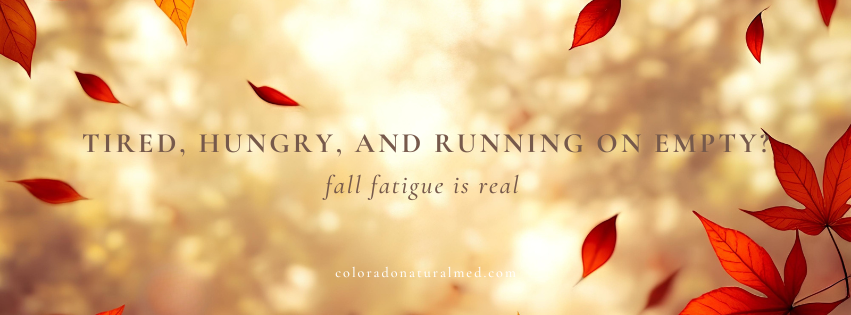
Why You’re More Tired (and Hungrier) When the Days Get Shorter
If shorter days have you craving carbs and crawling into bed early, your hormones are just trying to adapt.
Every fall, patients come in saying the same thing: “I’m exhausted, unmotivated, and constantly hungry.” The truth? Nothing’s wrong – your body is responding exactly as it’s designed to.
As daylight fades and temperatures drop here in Castle Rock, Colorado, your internal rhythms shift. But modern life doesn’t. We keep the same work hours, screen time, and social pace – even as our biology asks for rest. That mismatch leaves many people feeling sluggish, foggy, and out of sync.
Here’s what’s really happening – and how to help your body move with the season instead of against it.
Why Do Shorter Days Make Me So Tired?
Your body’s circadian rhythm – its internal clock – depends on sunlight. When daylight decreases in fall and winter, serotonin (which supports mood) drops, while melatonin (which signals sleep) rises.
That’s why you feel tired earlier, struggle to wake up, and notice your mood dip as the days shorten across Colorado’s Front Range.
How to Help:
- Get outside within 30 minutes of waking to expose your eyes to natural light.
- Take a short morning walk – even in cool air – to cue your circadian rhythm.
- Dim lights and avoid screens an hour before bed to support melatonin production.
- Consider a light-therapy lamp if you leave before sunrise.
How Do Stress and Cortisol Wreck My Sleep?
Cortisol gets a bad reputation, but it’s essential for daily energy. It should peak in the morning and taper off at night. Shorter daylight hours – and higher stress – can flatten this curve, leaving you tired in the morning and wired at night.
How to Help:
- Limit caffeine to the morning.
- Eat consistent meals to prevent stress-related energy crashes.
- Acupuncture helps regulate cortisol rhythm and restore your body’s stress balance.
- For some patients, targeted herbal support like Cortisol Manager (Integrative Therapeutics) may help – always under professional guidance.
Why Do I Crave Carbs When It Gets Dark Earlier?
When serotonin dips, your brain seeks quick ways to boost it – hello, sugar and starch.
Those foods temporarily raise serotonin but cause the crash that leaves you more fatigued and moody later.
How to Help:
- Build balanced meals with protein, fiber, and healthy fats.
- Choose complex carbs such as sweet potatoes, oats, and squash for steady energy.
- Pair carbs with protein or fat to blunt the crash.
- Stay hydrated – fatigue and cravings often stem from mild dehydration, especially in Colorado’s dry climate.
What Actually Helps Fall Fatigue?
Fall and winter are about turning inward – conserving energy, resting, and nourishing the body deeply. In East Asian Medicine, this season aligns with the Kidney system, which governs energy reserves, vitality, and resilience. Pushing through fatigue drains those reserves faster.
Try:
- Warm, slow-cooked meals like soups and stews with ginger, cinnamon, and garlic.
- Weekly acupuncture to strengthen energy, balance hormones, and support mood.
- Herbal support customized to your needs — herbs such as Rehmannia, Dong Quai, or Cordyceps. A classic blend like Liu Wei Di Huang Wan supports Kidney energy; we often recommend Nine Flavor Tea by Health Concerns.
- Stay hydrated – the dry Colorado air increases fatigue and cravings.
Supporting Your Body’s Natural Rhythm
If you’ve been more tired, hungrier, or craving comfort foods lately, it’s not a lack of willpower – it’s biology. Your body is adapting to shorter days and cooler weather.
Support it instead of fighting it:
- Get morning light.
- Eat nourishing, seasonal foods.
- Rest when your body asks for it.
When you align with the rhythm of the season, your energy, mood, and sleep all begin to rebalance naturally.
✨ Feeling drained this fall? Schedule a visit with Dr. Adam Graves, ND, LAc at Colorado Natural Medicine & Acupuncture to restore your energy. Conveniently located in downtown Castle Rock, CNMA serves patients throughout Douglas County, Arapahoe County, Jefferson County, and El Paso County.
Serving Castle Rock and the greater South Denver Front Range.
FAQs
How much morning light do I need?
Aim for 10 -15 minutes of outdoor light within 30 minutes of waking.
When should I stop drinking caffeine?
By late morning – usually before 11 a.m. – to allow cortisol to normalize.
Can acupuncture really help with seasonal fatigue?
Yes. By balancing cortisol and improving circulation, acupuncture helps regulate energy and mood naturally.
What should dinner look like for better sleep?
Include protein and vegetables; finish eating at least 2–3 hours before bed.
What if I keep waking up at 3 a.m.?
That often signals blood-sugar dips or cortisol imbalance. A small protein snack before bed and nervous-system support can help.
About the Author
Dr. Adam Graves, ND, LAc is a Naturopathic Doctor and Licensed Acupuncturist practicing in Castle Rock, CO. He specializes in integrative care for stress, fatigue, and hormonal balance using acupuncture, nutrition, and functional testing.

Leave a Reply